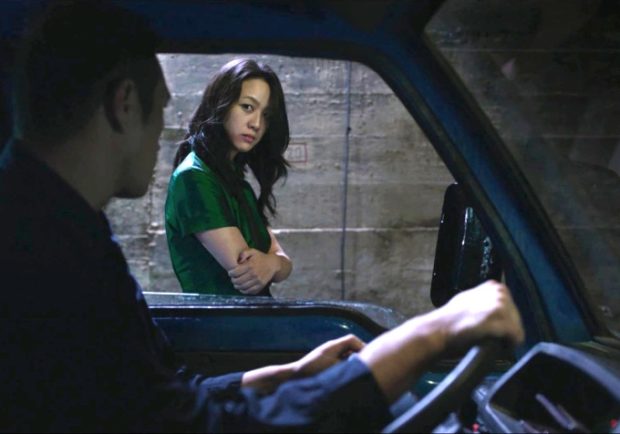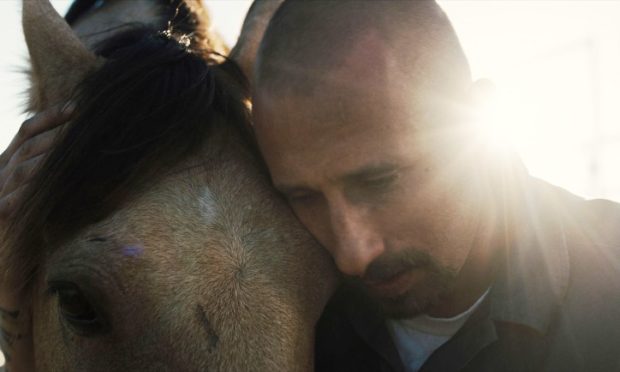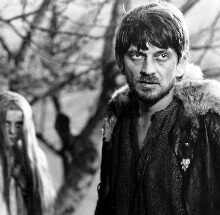
 Chinese director Bi Gan explores guilt and memory through the mechanism of a dream; while Laure de Clermont-Tonnerre tells of a violent prison inmate who helps tame a wild horse.
Chinese director Bi Gan explores guilt and memory through the mechanism of a dream; while Laure de Clermont-Tonnerre tells of a violent prison inmate who helps tame a wild horse.
I’ve talked about what I call “difficult” films before, and how and why they are, or can be, worthwhile. Long Day’s Journey Into Night, the latest film by Chinese writer-director Bi Gan, is an extreme example of this. I came in somewhat prepared, but I still found it quite difficult to understand. First of all, Long Day’s Journey Into Night has nothing to do with the famous Eugene O’Neill play of that name. The literal translation of the Chinese title is closer to something like “Looking at Last Night,” and I wonder how aware Bi Gan was that the English title would be confusing in that respect.
A taciturn young man, played by Jue Huang, returns to his hometown after his father’s death, while remembering his affair twenty years earlier with a mysterious woman in a green dress, and also trying to understand how a friend, nicknamed Wildcat, was murdered at that time. Now, even this brief statement of a premise is not clearly evident from watching the film, because the main character’s narration in the present, along with the depiction of his affair with the woman in the past, are presented elliptically, only in hints, snatches of memory and dialogue, and long wordless sequences that almost seem to be occurring in a hypnotic state.
Other plot elements slowly emerge. Apparently, the woman was in the grip of a criminal, the same man who murdered Wildcat. She tried to get the hero to shoot this outlaw in a movie theater, but it doesn’t appear that he went through with it. But it’s also possible that the woman herself killed Wildcat, and framed the other man for it. Back in the present, our protagonist meets another woman, the owner of a pool hall, who he thinks might know something about all this. Or maybe she’s the same woman. The presentation is so different that it wasn’t until the credits that I discovered the same actress played both women.
So does this sound like a detective story, or maybe a film noir? Well, it’s not. It’s not even what you would call a “puzzle film” but something even more rare, and rarely attempted: a dream film, and not as in the usual dream sequences we see in the movies, but a film structured like a dream, in which the very elements that make up the film, the style and editing and so forth, are like a dream. To me, this seemed like the kind of dream that you realize is a dream while you’re sleeping, but when you supposedly wake up, you’re actually still dreaming. All the details in this film are displacements, projections, repressions, symbols of one kind or another that have been unconsciously chosen to conceal the meanings that the conscious mind doesn’t want to perceive. The last hour or so of the picture, starting at the pool hall and going deep into the dreamer’s mind, is one amazing unbroken moving shot, and unlike the rest of the film, it’s in 3-D.
I also need to say that this is an incredibly beautiful film, but you have to let go of the need to reason or analyze, and let it just occur as if it were your dream. The producers marketed it in China as a big romantic epic, and it made a huge opening profit, but that plummeted when people couldn’t understand what was going on. A smart move in terms of marketing, I suppose, but, I think, bad for the reputation of this Long Day’s Journey Into Night.

On the more prosaic side of things, we have a film called The Mustang, in which a violent convict named Roman, doing time in a Nevada penitentiary, gets a chance to be a part of a program taming wild mustangs for eventual auction. It sounds like one of those Disney-type uplift films, but surprisingly it’s tough and gritty and very adult, conveying the degraded and abusive atmosphere of prison effectively. The director is Laure de Clermont-Tonnerre, and Roman is played by the excellent Matthias Schoenaerts. The reliable Bruce Dern is on hand as the old man in charge of the program.
The instinctive bond between the convict and the horse, both of which hate being in captivity, doesn’t have to be spelled out, and it isn’t—it’s vividly shown in Schoenaerts’ eyes and body language. There are some plot complications involving other inmates doing drug deals, but the real story is with the horses, and the men connecting with them. There are such programs in some prisons in the West. The Mustang takes the pain and guilt of incarcerated people seriously, and it’s a fine achievement.






